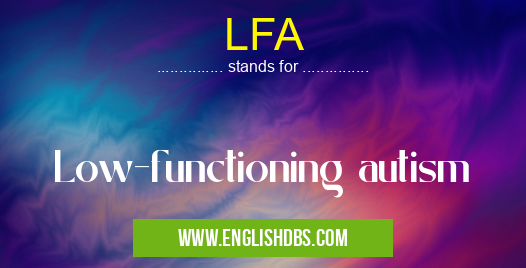What does LFA mean in RESEARCH
Low-functioning autism (LFA) is an umbrella term used to describe a range of autism spectrum disorders associated with severe language delays, communication difficulties, and inability to live independently. People with low-functioning autism often exhibit behaviors that are outside the range of typical social and developmental norms. Common symptoms of LFA include impaired speech and communication, limited social skills, motor delays, repetitive movements or patterns of behavior, sensory sensitivities, hyperactivity, and cognitive challenges. With the appropriate therapeutic interventions and education programs tailored to their specific needs, individuals with low-functioning autism can learn to effectively communicate their wants and needs and be successful in the home environment, community settings, and classrooms.

LFA meaning in Research in Academic & Science
LFA mostly used in an acronym Research in Category Academic & Science that means Low-functioning autism
Shorthand: LFA,
Full Form: Low-functioning autism
For more information of "Low-functioning autism", see the section below.
What does LFA mean?
Essential Questions and Answers on Low-functioning autism in "SCIENCE»RESEARCH"
What is low-functioning autism?
Low-functioning autism is a type of autism spectrum disorder (ASD) characterized by an intellectual disability and difficulty with communication and social interactions. Individuals with this type of ASD often experience significant delays in acquiring age-appropriate skills.
What behaviors are associated with low-functioning autism?
Individuals with low-functioning autism may exhibit behaviors such as aggression, self-injury, repetitive motions, lack of eye contact, difficulty understanding social cues, and impaired speech or language skills.
How is low-functioning autism typically diagnosed?
Low-functioning autism is typically diagnosed through comprehensive evaluations that include the use of standardized tests and observations by healthcare professionals with expertise in diagnosing ASD.
How does someone receive treatment for low-functioning autism?
Treatment for low-functioning autism typically includes specialized behavioral interventions tailored to the individual’s needs. Additionally, medications may be prescribed to address any coexisting conditions such as depression or anxiety.
What strategies can be used to help individuals with low-functioning autism?
There are many strategies that can help individuals with low-functioning autism such as structure, consistency, positive reinforcement, teaching self-help skills and visual supports. It is important to craft a plan tailored specifically for the individual’s needs in order to maximize success.
Does early intervention make a difference when it comes to treating people who have been diagnosed with low functioning Autism?
Yes! Early intervention can make a huge difference for individuals diagnosed with low functioning Autism. Early intervention involves working on developing basic learning and communication abilities which can greatly improve prognosis long term. It also allows time for professionals to form relationships that create trust so they can better understand how to work best with each individual's strengths and weaknesses.
How do I support my family member if they have been recently diagnosed with Low Functioning Autism?
Supporting your family member will look differently depending on their age/level of development and parent/caretaker’s level of comfort/skill set needed to offer support in caring for your loved one’s unique needs. An important first step would be participating in educational sessions where you can learn more about the diagnosis and programs available that could provide additional resources and support to all family members involved.
Is there practical advice that I can be given if my child has been just recently diagnosed with Low Functioning Autism?
It is important that you take some time for yourself following the diagnosis - diagnose doesn't change who your child is but it provides context into why they currently act the way they do from day to day; cherish those moments when things feel better even if they feel small; create a village around you so you know you're not alone - friends & family who understand what it's like raising a child w/LF Autism; most importantly remember your love has + & - days but still exists even when you don't feel it.
Are there any lifestyle modifications or special diets I should consider if my child has been just recently diagnosed with Low Functioning Autism?
While research continues surrounding alternative treatments such as diet modification, most practitioners recommend focusing on evidence based approaches like Applied Behavior Analysis (ABA). If you are considering introducing dietary modifications it may be appropriate to consult your health care provider prior due their potential side effects.
LFA also stands for: |
|
| All stands for LFA |
